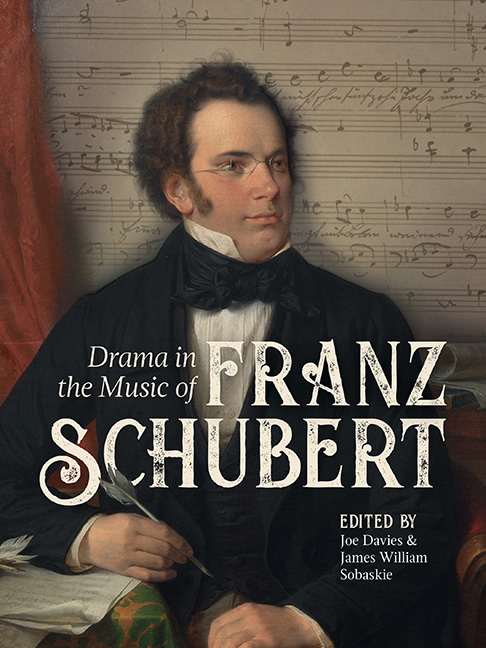Book contents
- Frontmatter
- Dedication
- Contents
- List of Figures
- List of Tables
- List of Contributors
- Acknowledgements
- Preface
- Introduction: Internal Dramas
- PART I STAGE AND SACRED WORKS
- PART II LIEDER
- 4 Schubert's Dramatic Lieder: Rehabilitating ‘Adelwold und Emma’, D. 211
- 5 Gretchen abbandonata: The Lied as Aria
- 6 The Dramatic Strategy Within Two of Schubert's Serenades
- 7 ‘Durch Nacht und Wind’: Tempesta as a Topic in Schubert's Lieder
- 8 Reentering Mozart's Hell: Schubert's ‘Gruppe aus dem Tartarus’, D. 583
- PART III INSTRUMENTAL MUSIC
- Select Bibliography
- Index
4 - Schubert's Dramatic Lieder: Rehabilitating ‘Adelwold und Emma’, D. 211
from PART II - LIEDER
Published online by Cambridge University Press: 25 March 2020
- Frontmatter
- Dedication
- Contents
- List of Figures
- List of Tables
- List of Contributors
- Acknowledgements
- Preface
- Introduction: Internal Dramas
- PART I STAGE AND SACRED WORKS
- PART II LIEDER
- 4 Schubert's Dramatic Lieder: Rehabilitating ‘Adelwold und Emma’, D. 211
- 5 Gretchen abbandonata: The Lied as Aria
- 6 The Dramatic Strategy Within Two of Schubert's Serenades
- 7 ‘Durch Nacht und Wind’: Tempesta as a Topic in Schubert's Lieder
- 8 Reentering Mozart's Hell: Schubert's ‘Gruppe aus dem Tartarus’, D. 583
- PART III INSTRUMENTAL MUSIC
- Select Bibliography
- Index
Summary
Introduction: Genre and Reception
In the hierarchical framework that has formed around Schubert's production of Lieder, the longer dramatic settings traditionally have been somewhat undervalued. Among these, ‘Adelwold und Emma’, D. 211 (1815), seems to have been particularly the victim of a classic vicious circle, neglected in performance and in scholarship – or despised by the critics when they have noticed it. At this point we might invoke Schumann's well-known epithet of ‘heavenly length’. This feature of Schubert's work has tended to arouse a response at opposite ends of the spectrum – either admiration or opprobrium – among the composer's devotees and critics. And length is the feature that informs the total substance of Richard Capell's commentary on ‘Adelwold und Emma’ in his Schubert's Songs, his comment merely being consigned to a footnote apropos mention of ‘some of the longest pieces’ among the extended ballads, with Capell observing of D. 211 only that it is ‘the longest of all … (26 pages)’.
Length is used by Capell as a means of setting up a prejudice against these early ballads. He introduces them thus: ‘[Among the songs of 1815] there are the numerous extended compositions in various movements. They are usually less inviting than the little strophic songs’; although he goes on to admit that ‘yet hardly one is without a beautiful page, whatever the inequalities of the whole’. Capell's comments on other ballads of 1815 include (on ‘Auf einen Kirchhof ’, D. 151): ‘Schubert has adopted a quasi-dramatic form and the song fails through excess of exertion’. Summing up the group of dramatic Lieder, he reiterates more forcefully the comparative stance he took at the start of the discussion: ‘It might have been thought that years separated such music from the masterpieces of the period. These compositions show Schubert in the act of practising his pen in the intervals between the visits of his genius’.
- Type
- Chapter
- Information
- Drama in the Music of Franz Schubert , pp. 85 - 106Publisher: Boydell & BrewerPrint publication year: 2019



